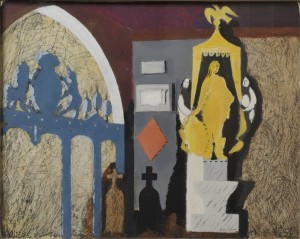Ditchley Park, Oxfordshire

Hidden Content, Images, Videos and Documents
Ditchley Park in Oxfordshire is architect James Gibbs’ most important country house. It was built in the Palladian style in the early 1720s following the demolition of the Tudor manor house bought in 1583 by the prominent courtier and Elisabeth’s Champion Sir Henry Lee after he had been appointed Ranger to the royal Wychwood hunting forest.
Owing to the absence of surviving heirs, Lee’s estate went in 1611 to a cousin, Sir Henry Lee 1st Baronet, whose family continued to live in the old manor house on the Ditchley estate. The arrival, through marriage, of Anne St John, daughter of Sir John St John, 1st Baronet of Lydiard Tregoze, brought her new family good fortune. Anne, whose Lely portrait graces the Tapestry Room of the current house, was widowed very young, three years before the start of the Civil War. Despite the family’s strong Royalist loyalties she adroitly survived the Cromwell years, retaining the Lee estates and subsequently going on to secure the marriage in 1677 of her grandson, Edward, 5th Baronet, to Charlotte Fitzroy, one of five illegitimate children Charles II fathered with his then principal mistress Barbara Villiers, Duchess of Cleveland - herself a member of the St John family. The union brought elevation of Edward to the earldom of Litchfield, along with a royal dowry, which doubtless enabled the Second Earl to inherit in 1716 an estate rich enough to build the much grander Palladian mansion.
The ‘new’ house remains very much as it was built, with the work of Kent, Flitcroft and prominent Italian stuccadori still intact. In addition, there is a number of artefacts and paintings that originate from the original manor house. This has helped make Ditchley a most attractive and interesting place to live and visit – the Dillon-Lees, successors to the Earls of Litchfield after the death without heir of the 4th Earl in 1776, were the owners for over 150 years. The demise of the 17th Viscount in 1932, a prominent antiquarian, who bequeathed a number of important paintings to the National Portrait Gallery, including the Ditchley Elisabeth portrait painted on the occasion of her royal progress of 1592, ended the Dillon era.
Ditchley was then bought by the wealthy Anglo-American Ronald Tree MP and his wife Nancy (later Lancaster of Colefax & Fowler renown): together they refurbished the mansion, ushering in a new style of country house comfort and, more importantly, a period of high social and political connection, including Winston Churchill who used Ditchley as an alternative weekend retreat when Chequers was vulnerable. It was here that much lobbying was discreetly conducted for ever closer US support and involvement in the war with Roosevelts’ closest officials: amongst the fruits of these intimate discussions was Lend Lease.
With the divorce of the Trees in 1948, the house was briefly owned by the 7th Earl of Wilton before Sir David Wills purchased the mansion as part of the Ditchley agricultural estate in 1953. Not needing to live at Ditchley, he eventually established the Ditchley Foundation in 1958 to support the Transatlantic Alliance between the US and Europe by bringing decision makers and experts together in a unique and inspiring setting, which includes some 300 acres of Listed parkland entailed as an amenity for its guests. This important founding mission, realised through conferences and other activities, remains very much Ditchley’s purpose today.
- Year:
- 1720-1730
- Type:
- Building
- Location:
- Oxfordshire
- Owner:
- Ditchley Foundation
- Copyright:
- Ditchley Park
- Last updated on:
- Tuesday 12th July 2022



